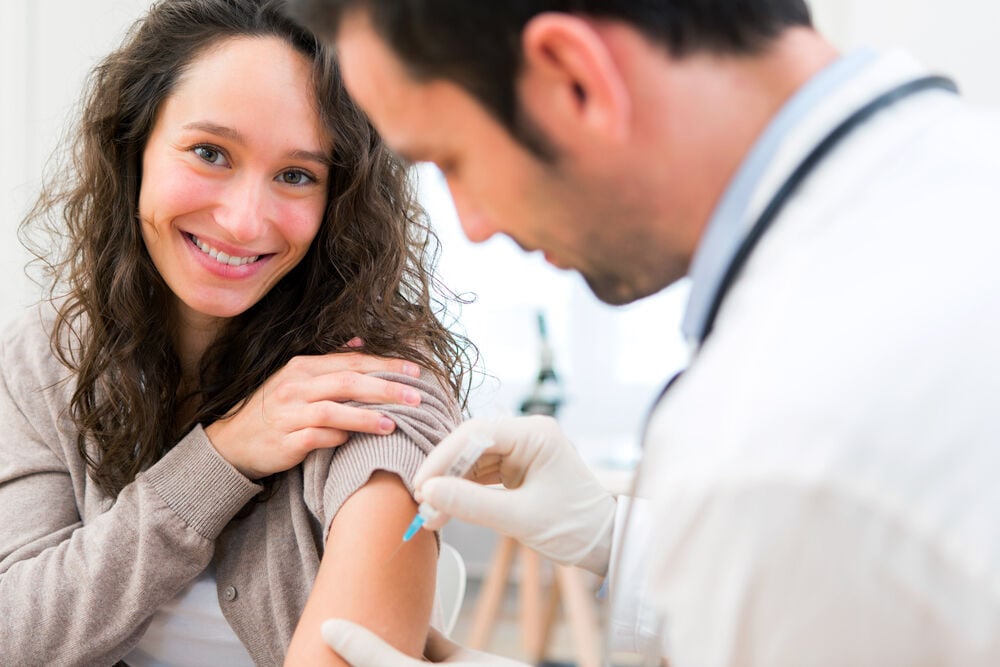We usually associate chickenpox with small children, but adults can get it too. Having chickenpox while pregnant can lead to several complications and negative consequences for your baby. Therefore, it’s better to avoid being exposed to chickenpox while you’re pregnant or trying to conceive. Read on to learn more.
-
Tracking cycle
-
Getting pregnant
-
Pregnancy
-
Help Center
-
Flo for Partners
-
Anonymous Mode
-
Flo app reviews
-
Flo Premium New
-
Secret Chats New
-
Symptom Checker New
-
Your cycle
-
Health 360°
-
Getting pregnant
-
Pregnancy
-
Being a mom
-
LGBTQ+
-
Quizzes
-
Ovulation calculator
-
hCG calculator
-
Pregnancy test calculator
-
Menstrual cycle calculator
-
Period calculator
-
Implantation calculator
-
Pregnancy weeks to months calculator
-
Pregnancy due date calculator
-
IVF and FET due date calculator
-
Due date calculator by ultrasound
-
Medical Affairs
-
Science & Research
-
Pass It On Project New
-
Privacy Portal
-
Press Center
-
Flo Accuracy
-
Careers
-
Contact Us
Chickenpox and Pregnancy: What Are the Risks?


Every piece of content at Flo Health adheres to the highest editorial standards for language, style, and medical accuracy. To learn what we do to deliver the best health and lifestyle insights to you, check out our content review principles.
What is chickenpox?
Chickenpox, or varicella, is an infectious disease caused by the varicella zoster virus. It’s a highly contagious, self-limited viral infection characterized by a generalized vesicular rash. This rash will then form fluid-filled blisters that will later become scabs and fall off. Erythematous macules (red spots), papules (solid bumps), vesicles, and scabbed lesions can also occur.
Chickenpox is also accompanied by generalized symptoms such as fever, malaise, headache, and abdominal pain. It’s an extremely contagious disease that will quickly spread to people who have never gotten it or who aren’t vaccinated against it.
This viral disease is much more common in children. Ninety percent of patients are younger than 10 years old. In fact, approximately 90 percent of women in their fertile years are immune to this disease. You can gain immunity to varicella either by being infected or by being vaccinated against the virus. However, adults can still get chickenpox in rare cases, and they’re more prone to developing complications from the disease. Herpes zoster (shingles) is when the varicella zoster virus reactivates and occurs along the skin areas supplied by spinal nerves.
Possible complications for pregnant women
Having chickenpox while pregnant can lead to complications for both the mother and fetus.
Women who develop chickenpox during pregnancy are at a higher risk of developing pneumonia. This risk is even higher if you smoke tobacco. Your risk is also higher if you have recently taken steroids or have lung disease.
Women who develop chickenpox during pregnancy are at a higher risk of developing pneumonia.
Other complications of getting chickenpox during pregnancy include inflammation of the brain, called encephalitis. The risk of complications for the mother is higher if they’re more than 20 weeks pregnant, during the second and third trimesters.
In very rare cases, complications of getting chickenpox while pregnant can lead to death. However, modern treatments have significantly reduced this risk.
Possible complications for a baby
Chickenpox during pregnancy can have different consequences depending on which stage of pregnancy you’re in.
If you get chickenpox in the first 20 weeks of your pregnancy, your baby could develop a condition called fetal or congenital varicella syndrome. This condition can cause several congenital abnormalities, such as:
- Skin scarring
- Limb underdevelopment
- Intrauterine growth retardation
- Low birth weight
It’s important to keep in mind that congenital varicella syndrome is extremely rare. The risk of birth defects caused by chickenpox is approximately 0.5–2 percent.
If you get chickenpox between weeks 20–36 of your pregnancy, there’s a chance that your baby will become infected but won’t develop the disease. Instead, the virus could lie dormant and cause shingles during childhood.
Take a quiz
Find out what you can do with our Health Assistant
Chickenpox during pregnancy can have different consequences depending on which stage of pregnancy you’re in.
If you catch varicella and develop the disease soon before delivering your baby, they could be born with a serious condition called neonatal varicella. This disease can cause preterm labor, and in some cases, it can lead to infant death.
Can a fetus get chickenpox from its mother?
Yes. The varicella zoster virus can be transmitted from a mother to her unborn baby, since it can cross the placental barrier. The probability of an infected mother transmitting the virus to a fetus varies from 5–25 percent depending on the trimester of pregnancy.
Symptoms of chickenpox in pregnancy
If you develop chickenpox during pregnancy, your symptoms will probably be similar to the ones experienced by any other patient with this disease. The virus has an incubation period of 10–21 days, and it’s most contagious approximately 2 days before the rash appears.
The symptoms of chickenpox include:
- Fever
- Malaise
- Muscular aches
- Headache
- Loss of appetite
- An itchy red rash that appears on your face and chest first before spreading to other body parts
- Fluid-filled blisters that crust, form scabs, and then heal (the blisters can become infected if you scratch them)
- Swollen lymphatic nodes
Treating chickenpox in pregnancy
If you’re pregnant and suspect that you have been exposed to the chickenpox virus and don’t know whether you are immune to it, you should seek immediate medical attention. Your doctor can perform a simple test to determine your chickenpox immunity status.
Varicella zoster immune globulin is used to prevent newborns exposed to chickenpox from getting the disease.
If you’re pregnant and suspect that you have been exposed to the chickenpox virus and don’t know whether you are immune to it, you should seek immediate medical attention.
Antiviral medications can also be used to treat chickenpox during pregnancy. Acyclovir is the medication most commonly used for this purpose.
Prevention of chickenpox in pregnancy

If you’ve never had chickenpox and want to try to conceive, you can ask your doctor about your options. If a test determines that you don’t have immunity against this disease, you can get vaccinated as an adult. However, you’ll need to wait at least three months after getting your second dose of the vaccine before you try to conceive.
When to see a doctor
It’s very important to seek medical attention if you’re pregnant and suspect you’ve been exposed to chickenpox. Varicella is a highly contagious disease, so if you’re pregnant and anyone in your household develops the condition, it’s a good idea to go to the doctor. Getting an early diagnosis and preventive treatment can significantly improve outcomes for pregnant women with chickenpox and their unborn children.
Getting chickenpox while pregnant can cause anxiety and concern, but going to the doctor quickly and getting proper treatment can help prevent harmful consequences. Although varicella can cause serious complications for both mother and child, these instances are very rare and can usually be avoided through good medical care.


Hey, I'm Anique
I started using Flo app to track my period and ovulation because we wanted to have a baby.


The Flo app helped me learn about my body and spot ovulation signs during our conception journey.


I vividly
remember the day
that we switched
Flo into
Pregnancy Mode — it was
such a special
moment.
Real stories, real results
Learn how the Flo app became an amazing cheerleader for us on our conception journey.




